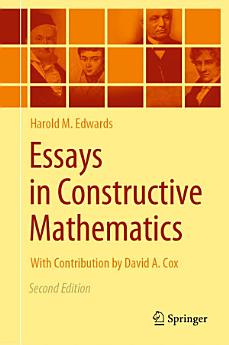Essays in Constructive Mathematics: Edition 2
sept 2022 · Springer Nature
eBook
322
Páginas
reportLas valoraciones y las reseñas no se verifican. Más información
Información sobre este eBook
He [Kronecker] was, in fact, attempting to describe and to initiate a new branch of mathematics, which would contain both number theory and alge braic geometry as special cases.—Andre Weil [62] This book is about mathematics, not the history or philosophy of mathemat ics. Still, history and philosophy were prominent among my motives for writing it, and historical and philosophical issues will be major factors in determining whether it wins acceptance. Most mathematicians prefer constructive methods. Given two proofs of the same statement, one constructive and the other not, most will prefer the constructive proof. The real philosophical disagreement over the role of con structions in mathematics is between those—the majority—who believe that to exclude from mathematics all statements that cannot be proved construc tively would omit far too much, and those of us who believe, on the contrary, that the most interesting parts of mathematics can be dealt with construc tively, and that the greater rigor and precision of mathematics done in that way adds immensely to its value.
Acerca del autor
Harold M. Edwards [1936–2020] was Professor Emeritus of Mathematics at New York University. His research interests lay in number theory, algebra, and the history and philosophy of mathematics. He authored numerous books, including Riemann’s Zeta Function (1974, 2001) and Fermat’s Last Theorem (1977), for which he received the Leroy P. Steele Prize for mathematical exposition in 1980.
David A. Cox (Contributing Author) is Professor Emeritus of Mathematics in the Department of Mathematics and Statistics of Amherst College. He received the Leroy P. Steele Prize for mathematical exposition in 2016 for his book Ideals, Varieties, and Algorithms, with John Little and Donal O’Shea.
Valorar este eBook
Danos tu opinión.
Información sobre cómo leer
Smartphones y tablets
Instala la aplicación Google Play Libros para Android y iPad/iPhone. Se sincroniza automáticamente con tu cuenta y te permite leer contenido online o sin conexión estés donde estés.
Ordenadores portátiles y de escritorio
Puedes usar el navegador web del ordenador para escuchar audiolibros que hayas comprado en Google Play.
eReaders y otros dispositivos
Para leer en dispositivos de tinta electrónica, como los lectores de libros electrónicos de Kobo, es necesario descargar un archivo y transferirlo al dispositivo. Sigue las instrucciones detalladas del Centro de Ayuda para transferir archivos a lectores de libros electrónicos compatibles.






